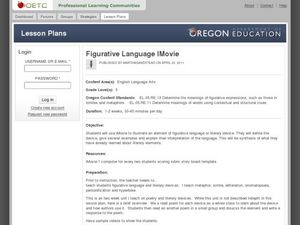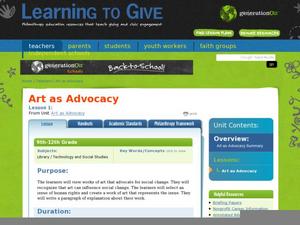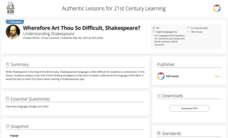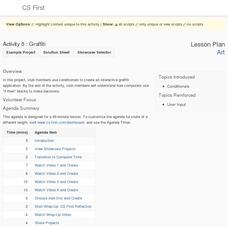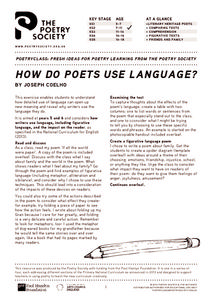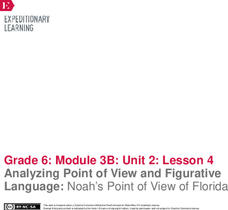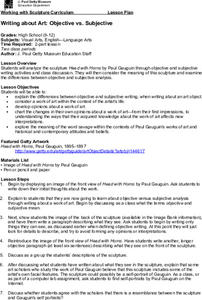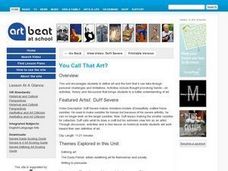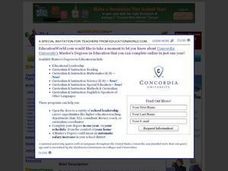Curated OER
If Paintings Could Talk: Art and Language
Middle schoolers learn about the artist Canaletto, play a vocabulary game, and create a landscape using collage technique. Background information on the artist is provided along with instructions for the game and vocabulary words to...
Curated OER
Language Arts: Telling a Painting's Story
Use art museum paintings as inspiration for your class's creative writing works. Observing the paintings closely, middle and high schoolers list details and write descriptions. Their completed stories are displayed on bulletin boards...
Nosapo
Body Language
When it comes to learning a language and literacy, understanding nonverbal communication is often as important as verbal communication. An interactive body language activity incorporates role play to demonstrate the difference between...
Curated OER
Figurative Language iMovie
In order to understand figurative language, learners read 5 poems, each exemplifying a different literary device. They discuss and write responses to each poem. They then choose one literary device which they will use as the basis for a...
Curated OER
Art as Advocacy for Social Change
“Humanscape No.65” by Melesia Casas and Ester Hernandez’s “Sun Maid Raisins” launch a study of how works of art can advocate for social change. After examining these two works and discussing the human rights issues raised, class members...
K20 LEARN
Wherefore Art Thou So Difficult, Shakespeare? Understanding Shakespeare
'Tis not easy to understand the language of the Bard! But, hark! Fret not! With the assistance of this joyous activity, young players learn how to translate Shakespeare's English into modern language. Groups examine passages from Julius...
Google
Art: Graffiti
Your principal won't mind graffiti, as long as it's on a virtual wall. Scholars use the Scratch block-based computer language to write a program on graffiti. The program lets users place certain designs on a wall.
Curated OER
Debates on Persuasive Language That Extend Outside of Class
There is no better sight to see than a classroom full of eager young adults, hands raised high, eager to jump into a class discussion. Get your class identifying and discussing rhetorical strategies and then debating long into the night...
Curated OER
Art Criticism: Understanding Wayne Thiebaud's Salads, Sandwiches, and Desserts
Analysis consists of an understanding and interpretation of evidence and elements found in any number of expressive mediums. Upper graders critique the work of American Realist Wayne Thiebaud through a series of excellent guided...
Curated OER
Lesson: Daria Martin: Body as Language
There is a wonderful magic that happens when artists collaborate. Kids examine storytelling through collaborative art. Inspired by Rodin's sculpture Minotaur, Daria Martin and Anna Halprin create a filmed dance sequence. Kids analyze the...
The New York Times
Evaluating Sources in a ‘Post-Truth’ World: Ideas for Teaching and Learning about Fake News
The framers of the United States Constitution felt a free press was so essential to a democracy that they granted the press the protection it needed to hold the powerful to account in the First Amendment. Today, digital natives need to...
J. Paul Getty Trust
Looking and Learning in the Art Museum — Lesson 1
To prepare for a field trip to a local art museum, art class members journal their initial reactions to a reproduction of the work they will focus on during their visit. The whole class then considers the artistic elements in the piece...
Poetry Society
How do Poets Use Language?
Why do writers choose the language they do? Here's a resource that has the poet himself answer that very question. Joseph Coelho explains why he chose the words and images he used in his poem, "If All the World Were Paper."
Curated OER
Responding: "Guerrila" Art
Eighth graders are introduced to performance art as a way to respond to important current-day issues in society. Pupils create their very own original art work using photography and poetry. These three lessons do a nice job of, not only...
Achieve3000
Figurative Language
Similes and metaphors make writing more beautiful and detailed, but can be a little harder to decipher during a first reading. Use a passage from The Man Who Loved Words to show young readers how to think through passages that contain...
EngageNY
Analyzing Powerful Language: Learning to Read
The power of a word. Readers learn the importance of word choice in shaping a text by using a Powerful Language T-chart to separate strong words and phrases from those that are more bland. They then complete a third read and question set...
EngageNY
Analyzing Point of View and Figurative Language: Noah’s Point of View of Florida
Fishing for words. Scholars search for unfamiliar words in pages 27-29 of Flush, place them in their word catchers, and complete part of Noah’s Point of View graphic organizer. After identifying figurative language, learners analyze tone...
Curated OER
Lesson: Urs Fischer: Reviving the Past Art Movements
Seven major abstract art movements are analyzed by learners in groups. Each group analyzes various works by determining which work belongs to which movement. They then read Flatland, engage in an art and literary analysis discussion,...
Curated OER
Trip to an Art Gallery
Have your Spanish speakers give museum tours with this interactive plan. To simplify this entertaining idea, bring in art pieces and create a gallery in your very own classroom. Provide the names of different works of art and have your...
Curated OER
Writing About Art: Subjective vs. Objective
Explore objective and subjective writing in this interdisciplinary lesson, which brings language arts and visual art together. Middle and high school young scholars examine the sculpture Head with Horns by Paul Gauguin. They then analyze...
Curated OER
You Call That Art? - Activity 1
Learners formulate a definition of art in the introductory lesson for a unit on various art forms. The learning emphasis is placed on Oregonian artist Duff Severe and reflective writing. Students compose an essay describing various art...
Curated OER
The Study of Theme and Figurative Language in Poetry and/or Prose
Identify and analyze the use of figurative language used in select pieces of writing. These pieces of literature will represent at least two pieces by one writer and at least two pieces by different writers. This lesson would be a great...
Curated OER
Foreign Language Lip-Sync Karaoke Contest
Teach your class about foreign language through transcribing lyrics. They will transcribe the lyrics of a song in a foreign language and use the lyrics to create a cloze activity as they listen and speak the language with their...
Curated OER
Classroom Language
A very interesting worksheet on language aquisition is here for you. In it, learners are presented with many common phrases in the English language, and they must write down how they would say that phrase in their own language. This...





